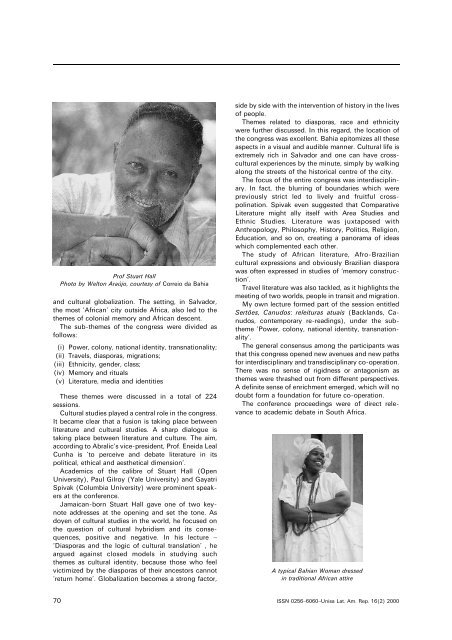pdf: 6.426kb - University of South Africa
pdf: 6.426kb - University of South Africa
pdf: 6.426kb - University of South Africa
Create successful ePaper yourself
Turn your PDF publications into a flip-book with our unique Google optimized e-Paper software.
Pr<strong>of</strong> Stuart Hall<br />
Photo by Welton ArauÂjo, courtesy <strong>of</strong> Correio da Bahia<br />
and cultural globalization. The setting, in Salvador,<br />
the most `<strong>Africa</strong>n' city outside <strong>Africa</strong>, also led to the<br />
themes <strong>of</strong> colonial memory and <strong>Africa</strong>n descent.<br />
The sub-themes <strong>of</strong> the congress were divided as<br />
follows:<br />
(i) Power, colony, national identity, transnationality;<br />
(ii) Travels, diasporas, migrations;<br />
(iii) Ethnicity, gender, class;<br />
(iv) Memory and rituals<br />
(v) Literature, media and identities<br />
These themes were discussed in a total <strong>of</strong> 224<br />
sessions.<br />
Cultural studies played a central role in the congress.<br />
It became clear that a fusion is taking place between<br />
literature and cultural studies. A sharp dialogue is<br />
taking place between literature and culture. The aim,<br />
according to Abralic's vice-president, Pr<strong>of</strong>. Eneida Leal<br />
Cunha is `to perceive and debate literature in its<br />
political, ethical and aesthetical dimension'.<br />
Academics <strong>of</strong> the calibre <strong>of</strong> Stuart Hall (Open<br />
<strong>University</strong>), Paul Gilroy (Yale <strong>University</strong>) and Gayatri<br />
Spivak (Columbia <strong>University</strong>) were prominent speakers<br />
at the conference.<br />
Jamaican-born Stuart Hall gave one <strong>of</strong> two keynote<br />
addresses at the opening and set the tone. As<br />
doyen <strong>of</strong> cultural studies in the world, he focused on<br />
the question <strong>of</strong> cultural hybridism and its consequences,<br />
positive and negative. In his lecture ±<br />
`Diasporas and the logic <strong>of</strong> cultural translation' , he<br />
argued against closed models in studying such<br />
themes as cultural identity, because those who feel<br />
victimized by the diasporas <strong>of</strong> their ancestors cannot<br />
`return home'. Globalization becomes a strong factor,<br />
side by side with the intervention <strong>of</strong> history in the lives<br />
<strong>of</strong> people.<br />
Themes related to diasporas, race and ethnicity<br />
were further discussed. In this regard, the location <strong>of</strong><br />
the congress was excellent. Bahia epitomizes all these<br />
aspects in a visual and audible manner. Cultural life is<br />
extremely rich in Salvador and one can have crosscultural<br />
experiences by the minute, simply by walking<br />
along the streets <strong>of</strong> the historical centre <strong>of</strong> the city.<br />
The focus <strong>of</strong> the entire congress was interdisciplinary.<br />
In fact, the blurring <strong>of</strong> boundaries which were<br />
previously strict led to lively and fruitful crosspolination.<br />
Spivak even suggested that Comparative<br />
Literature might ally itself with Area Studies and<br />
Ethnic Studies. Literature was juxtaposed with<br />
Anthropology, Philosophy, History, Politics, Religion,<br />
Education, and so on, creating a panorama <strong>of</strong> ideas<br />
which complemented each other.<br />
The study <strong>of</strong> <strong>Africa</strong>n literature, Afro-Brazilian<br />
cultural expressions and obviously Brazilian diaspora<br />
was <strong>of</strong>ten expressed in studies <strong>of</strong> `memory construction'.<br />
Travel literature was also tackled, as it highlights the<br />
meeting <strong>of</strong> two worlds, people in transit and migration.<br />
My own lecture formed part <strong>of</strong> the session entitled<br />
SertoÄes, Canudos: releituras atuais (Backlands, Canudos,<br />
contemporary re-readings), under the subtheme<br />
`Power, colony, national identity, transnationality'.<br />
The general consensus among the participants was<br />
that this congress opened new avenues and new paths<br />
for interdisciplinary and transdisciplinary co-operation.<br />
There was no sense <strong>of</strong> rigidness or antagonism as<br />
themes were thrashed out from different perspectives.<br />
A definite sense <strong>of</strong> enrichment emerged, which will no<br />
doubt form a foundation for future co-operation.<br />
The conference proceedings were <strong>of</strong> direct relevance<br />
to academic debate in <strong>South</strong> <strong>Africa</strong>.<br />
A typical Bahian Woman dressed<br />
in traditional <strong>Africa</strong>n attire<br />
70 ISSN 0256±6060±Unisa Lat. Am. Rep. 16(2) 2000

















